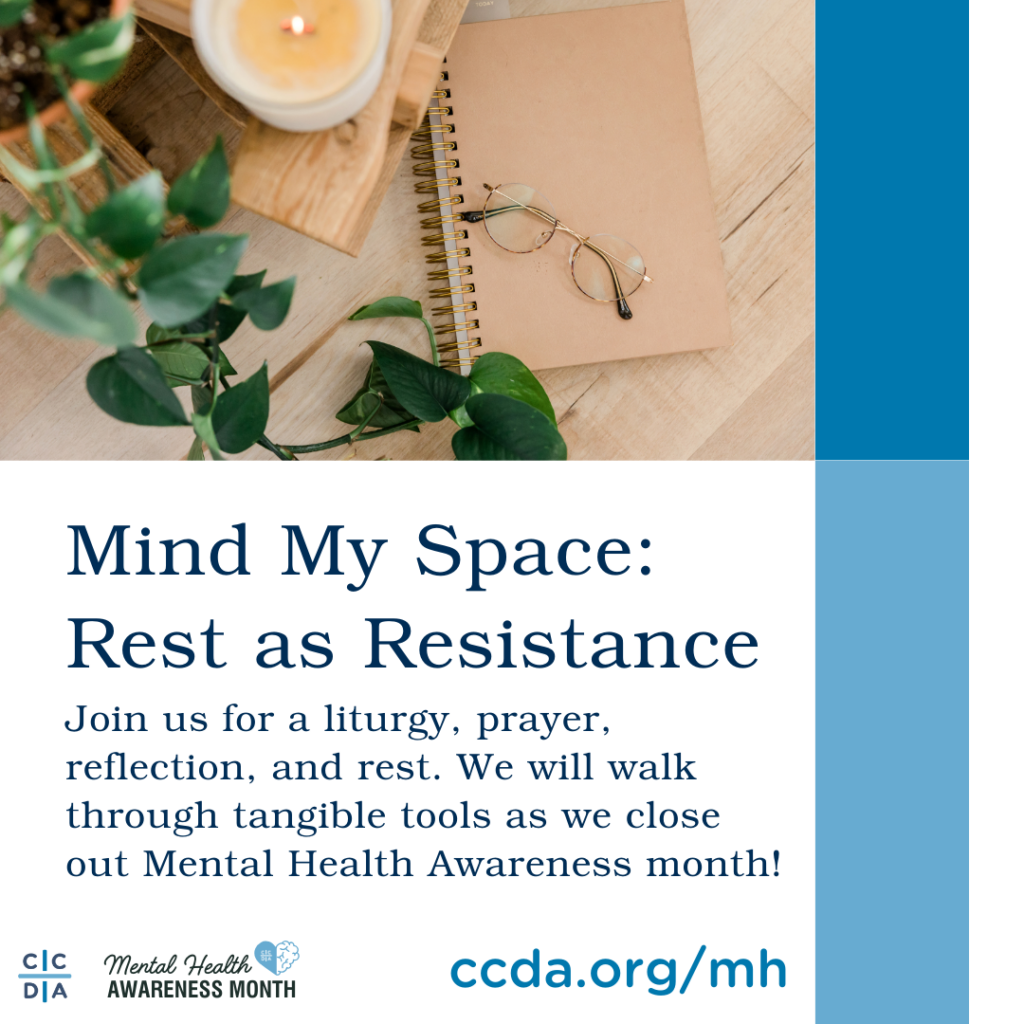This post is part of CCDA’s Mental Health Awareness Month. CCDA has a plethora of options to increase your mental health support, and we are constantly adding new resources to help you and your community flourish.
Join us for an event, complete the Mental Health Survey, or download the Mental Health Toolkit.
Our mental health is like a garden. In a physical garden, a gardener must steward a vision for that space, which can simultaneously produce some kind of yield and also honor the land within its ecosystem.
Our mind is given to us. We don’t get to choose it any more than the gardener gets to choose how the makeup of the particular landscape and climate came together in its own origin story. I guess the gardener can choose when and where to plant to a degree, but the larger ecosystem realities are out of his or her control. The work of gardening operates within those limits. Much the same with our mental health. Our minds have different variations of limits placed upon them (and that can vary throughout the seasons of our lives).
For those of us working in the mental health field, we also get to use some really helpful tools. In my own context of a Midwestern psychiatric hospital, our teams daily use mental health “tools” like Cognitive Behavioral Therapy, Mindfulness, Crisis Response Plans, PHQ-9s, facilitation of coping skills, psychiatric medication, Expressive Therapy, Dialectical Behavioral Therapy, and more.
For followers of Jesus who find themselves working in mental health spaces, there is a “botanical tool” that we can’t do without. And it’s something that comes from a garden – namely, the Vine.
Connection to the Vine
Without connection to the Vine (John 15:5) our practical help, hard work for those desperately struggling, efforts at strengthening fellow workers in the mental health community, or creating pathways for conversation in the church regarding mental health will all amount the very little actual long-lasting fruit (according to the verse, technically “nothing” in terms of what we can do).
This is something that I must remind myself of. How am I prioritizing my relationship with Jesus so that I can authentically love people where they are at? Whether that would be co-workers, patients, or people in the community who are struggling with their mental health, whom I walk among.
I’ve experienced enough life to know the feeling of when I am attempting to work too much for too long under my own power and strength (awareness of that is a piece of my own mental health and spiritual health, and a grace from God, right?). If I ignore that for too long, my guess is that some effects will start to show in my body, too.
Discipleship to Jesus includes our mental health, of course. Checking in on others and being led by the Spirit to give a word of encouragement is a way to invest significantly in the development of our community (which is the build-up of our relational world that we are gardeners of). Another example is spending time in listening prayer, which will deepen our intimacy with the Lord and unlock things we need to see and hear from Him regarding ourselves and others.
I’ve been told by someone who spent significant time discipling me that “we can’t give away what we haven’t been given.” And if we don’t carve out space to receive what Jesus wants to pour into us, then we run the risk of being empty vessels. If we want to see the beauty, goodness, and justice of Jesus embodied in our neighborhoods and CCDA contexts, then we will need to spend intentional time aligning ourselves with His heart and His eyes.
I have found prayer the most accessible, and paradoxically the most powerful, way to move toward holistic gospel saturation in me so that I can partner with what the Spirit is doing in his church (the people of God) everywhere I go, to bring about gospel saturation in my city someday. Let’s simply pray for the hunger to pray.
Tending the Garden
We, as mental health professionals and para-professionals in the CCDA network, have been sent by Jesus on mission into the chaotic landscape of many varied settings (inpatient, outpatient, addiction recovery, urban, rural, suburban, home health, telehealth, pediatric, geriatric, adult, adolescent, and more). Some of us feel hopeful and excited for what’s to come. Others of us feel thin and worn down. And our specific invitations from the Lord for our own mental and spiritual health are just as diverse as the settings we inhabit.
Let’s listen to what God has to say about what is happening in our specific therapeutic environments. Each of us has a God-given gift. How does God want us to use it within mental health work? How is He preparing us to use it more?
This seems to be a very unique time in history regarding the discoveries and significant challenges of mental health in our world. So let us not forget that we have been sent into these spaces. As we go, let’s lean into how the Spirit is guiding us for contextualizing what a disciple of Jesus looks like (while being authentic to the story that He has used to shape us) towards those that we are proximate to and are watching us. I sense the Spirit is working in deep and subversive ways toward something unexpected, something that most church leaders aren’t even looking for. I hope and pray we are ready.
May our need drive us to deep dependence on the Father and to not veer from the critical connection to the Vine. Staying close to the Vine means a lot of things, but put simply, we need to know the words of the Vine, depend on the Vine, and move like the Vine (following and trusting the words, works, and ways of Jesus).
I pray that each one of us would take this Mental Health Awareness Month to reflect on the garden that we have happened upon, and how God is inviting us as a community to stay connected to Him in the midst of unexpected circumstances while we wait expectantly for Him, the Master Gardener, to show.

About Carl Olson
Carl lives in southeastern South Dakota with his wife and four children. He works as a para-professional at a psychiatric hospital, primarily with adolescents. His topics of interest include: mission, creative expressions of church, disciple-making, and community development on the margins. You can catch him trying to collaborate with other similarly-passioned people in his context. A South Dakota CCDA Local Network is in its own early stage of growth and development for this region.





